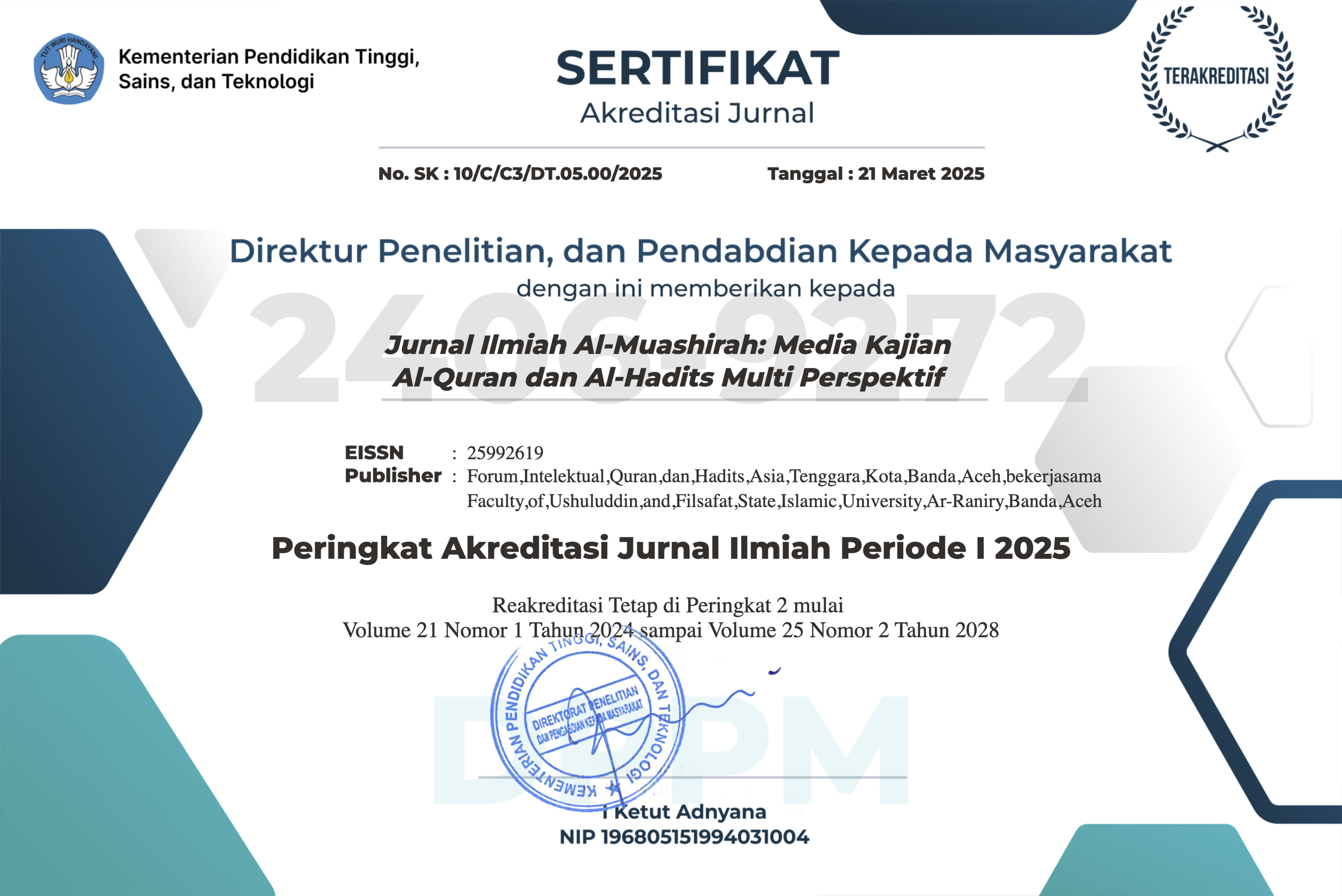Generation Z’s Understanding of Qur'anic Verses and Hadiths Regarding Zakat al-Mal: A Case Study in Banda Aceh
DOI:
https://doi.org/10.22373/jim.v22i1.29189Keywords:
Generation Z, Understanding, Zakat al-Mal, Qur’anic Verses, Hadith, Islamic Education.Abstract
This study examines the level of understanding among Generation Z in Banda Aceh regarding Qur’anic verses and hadiths related to zakat mal, utilizing a quantitative approach based on seven cognitive indicators: interpreting, explaining, exemplifying, classifying, summarizing, comparing, and inferring. Data were collected through an online questionnaire distributed via Google Forms to 105 respondents. The results indicate a moderate level of comprehension, with the following scores: explaining (69.20%), classifying (68.95%), inferring (68.69%), exemplifying (68.25%), comparing (68.06%), summarizing (67.04%), and interpreting (66.98%). Explaining emerged as the strongest indicator, while interpreting was the weakest. Although the respondents demonstrated a fair understanding of Zakat al-Mal, further educational efforts are needed to deepen both their conceptual and contextual understanding of this Islamic obligation. This study provides empirical insights for educational institutions and religious authorities to enhance Zakat al-Mal literacy among Generation Z and serves as a foundation for future research on the socio-economic application of Zakat.Downloads
References
Al-Qurtubi, Kitab Tafsir Al-Qurtubi (1), 2009
———, Kitab Tafsir Al-Qurtubi (2), 2009
———, Kitab Tafsir Al-Qurtubi (8)
Anderson, Lorin W., David R. Krathwohl, and Benjamin Samuel Bloom, A Taxonomy for Learning, Teaching, and Assessing: A Revision of Bloom’s Taxonomy of Educational Objectives (Addison Wesley Longman, Inc., 2001)
Ayu, Navirta, ‘Analisis Pemahaman Zakat Terhadap Membayar Zakat Di BAZNAS Pada Kalangan Civitas Akademik Sekolah Tinggi Agama Islam Yogyakarta’, Mumtaz : Jurnal Ekonomi Dan Bisnis Islam, 2.1 (2023), pp. 1–11
Ayuniyyah, Qurroh, Ataul Huq Pramanik, Norma Md Saad, and Muhammad Irwan Ariffin, ‘The Impact of Zakat in Poverty Alleviation and Income Inequality Reduction from the Perspective of Gender in West Java, Indonesia’, International Journal of Islamic and Middle Eastern Finance and Management, 15.5 (2022), pp. 924–42, doi:10.1108/IMEFM-08-2020-0403
Az-Zuhaili, Wahbah, ‘Aqidah, Syariah,Manhaj (Al-Fatihah-Al-Baqarah) Juz 1 & 2’, in Terjemahan Tafsi Al-Munir (Gema Insani, 2013), pp. 493–510
Azzuhriyyah, Azka Aminah, Indrawati, and Gadang Ramantoko, ‘A Systematic Literature Review on Metaverse’, Journal of Islamic Finance, 10.2 (2023), pp. 118–25, doi:10.2991/978-94-6463-340-5_11
Bahroni, Badrus, ‘Tingkat Pemahaman Zakat Pada Generasi Milenial Dan Z: Studi Perbandingan Mahasiswa PTKIN’, Jurnal Ekonomi Syariah, 14.1 (2022), pp. 44–55
Firdaus, Farah Arum, Irham Zaki, and Sri Herianingrum, ‘The Role Of Generation Z Through Online Platform in Optimizing of Zakat Literacy and Fundraising’, AZKA International Journal of Zakat & Social Finance, 4.1 (2023), pp. 13–22, doi:10.51377/azjaf.vol4no1.118
Fitriani, Rina, ‘Konstruksi Pemikiran Zakat Mal Dalam Konteks Sosial Modern: Studi Generasi Muda Muslim’, Jurnal Pemikiran Islam, 15.1 (2023), pp. 23–39
Hapsari, Rinanti Nur, Syarifaniaty Miranda Agustina, Richy Wijaya, and Mia Rahma Romadona, ‘Kurangnya Keterampilan Komunikasi Generasi Z Memasuki Pasar Kerja’, Jurnal Pekommas, 9.1 (2024), pp. 55–66, doi:10.56873/jpkm.v9i1.5241
Japar, Rahayu, Muhammad Yusuf, and Ahmad Mujahid, ‘Peran Zakat Maal Dalam Pembangunan Ekonomi Menurut Al-Qur’an’, Journal of Accounting, Management, Economics, and Business, 2.3 (2024), pp. 245–64, doi:10.56855/analysis.v2i3.1201
Kahf, Monzer, Zakah Management In Some Muslim Societies, Background Paper No. 11, Islamic Development Bank Islamic Research and Training Institute, 2019, XI
Muhtadi, Ahmad, ‘Zakat Dalam Perspektif Hermeneutika Tematik Al-Qur’an’, Jurnal Studi Keislaman, 7.2 (2021), pp. 134–50
Murtaza MZ, Ahmad, ‘Kontekstualisasi Pemahaman Ayat-Ayat Al-Qur’an Terhadap Pendidikan Sosial’, Jurnal Pendidikan Islam, 2.1 (2024), pp. 16–29, doi:10.24952/fahmina.v2i1.10812
Nafiati, Dewi Amaliah, ‘Revisi Taksonomi Bloom: Kognitif, Afektif, Dan Psikomotorik’, Humanika, Kajian Ilmiah Mata Kuliah Umum, 21.2 (2021), pp. 151–72, doi:10.21831/hum.v21i2.29252
Nurlina, Siti, and Ahmad. Maimun, ‘Pengaruh Pengetahuan Dan Sikap Terhadap Perilaku Zakat Pada Generasi Z Di Banda Aceh’, Jurnal Al-Muamalat, 12.3 (2020), pp. 98–110
Pertiwi, Hana Pertiwi, Atika Atika, and Muhammad Abdillah, ‘Reconstructing Zakat within Sharia Philanthropy’, Journal of Islamic Economics Management and Business (JIEMB), 5.2 (2023), pp. 227–42, doi:10.21580/jiemb.2023.5.2.22284
Prasetyo, Rizki Heri, Masduki Asbari, and Salsabila Amelia Putri, ‘Mendidik Generasi Z: Tantangan Dan Strategi Di Era Digital’, Journal of Information Systems and Management (JISMA), 3.1 (2024), pp. 10–13
Sabiq, Sayyid, ‘Fiqh Al-Sunnah’ (Al-Maktabah Al-Asriyyah, 1953), p. 246
Sahroni, Oni, Mohamad Suharsono, Agus Setiawan, and Adi Setiawan, Fikih Zakat Kontemporer (PT RajaGrafindo Persada, 2017)
Saleh, Muhammad, and Suaib Lubis, ‘Pengaruh Kesadaran Masyarakat Terhadap Kepatuhan Membayar Zakat Mal’, Jurnal Ekonomi Dan Keuangan Syariah, 1.1 (2022), pp. 26–34
Santoso, Slamet, Yeni Cahyono, Khusnatul Zulva Wafirotin, and Riza Dessy Nila Ayutika, ‘An Analysis of Muzakis Behavior in Paying Zakat Mal and Factors Influencing It: The Perspective of The Theory of Planned Behavior’, JIFA (Journal of Islamic Finance and Accounting), 4.2 (2022), pp. 94–107, doi:10.22515/jifa.v4i2.4912
Sari, Dwi Ayu, and Fitri Rahmawati, ‘Persepsi Mahasiswa Terhadap Pemahaman Zakat: Pendekatan Kualitatif Tematik’, Al-Uqud: Journal of Islamic Economics, 7.1 (2023), pp. 88–101
Sekar Arum, Lingga, Amira Zahrani, and Nickyta Arcindy Duha, ‘Karakteristik Generasi Z Dan Kesiapannya Dalam Menghadapi Bonus Demografi 2030’, Accounting Student Research Journal, 2.1 (2023), pp. 59–72, doi:10.62108/asrj.v2i1.5812
Shihab, M Quraish, Al-Misbah: Pesan, Kesan, Dan Keserasian Al-Qur’an (Surah Al-A’raf, Surah Al-Anfal, Surah At-Taubah)
Syahri Ramayani, Saipul Hadi T, and Muhammad Uzair Zulkifly, ‘The Influence of Religiosity, Knowledge, and Income on the Decision of Muzakki to Pay Zakat Mal in Baitul Mal Aceh Tamiang’, ASNAF : Journal of Economic Welfare, Philantrophy, Zakat and Waqf, 02.01 (2023), pp. 47–69, doi:10.32505/asnaf.v2i1.6054
Zaini, Hasan, ‘Pendidikan Zakat Di Era Digital: Pendekatan Sosio-Pedagogis Pada Generasi Z 10(2), 55–68.’, Jurnal Tarbiyah Islamiyah, 10.2 (2022), pp. 55–68
Zulaekah, Siti Zulaekah, Triya Oftafiana, and Mei Azizatur Rohmah, ‘The Effect of Sharia Audit on the Level of Public Trust in the National Zakat Amil Tulungagung’, Balance: Journal of Islamic Accounting, 3.2 (2022), pp. 124–42, doi:10.21274/balance.v3i2.5661
Downloads
Published
Issue
Section
License
Authors who publish in Jurnal Ilmiah Al-Mu'ashirah agree to the following terms:
- Authors retain copyright and grant the journal right of first publication with the work simultaneously licensed under a Attribution-ShareAlike 4.0 International (CC BY-SA 4.0) License that allows others to share the work with an acknowledgment of the work's authorship and initial publication in this journal.
- Authors are able to enter into separate, additional contractual arrangements for the non-exclusive distribution of the journal's published version of the work (e.g., post it to an institutional repository or publish it in a book), with an acknowledgment of its initial publication in this journal.
- Authors are permitted and encouraged to post their work online (e.g., in institutional repositories or on their website) prior to and during the submission process, as it can lead to productive exchanges, as well as earlier and greater citation of published work (See The Effect of Open Access).














